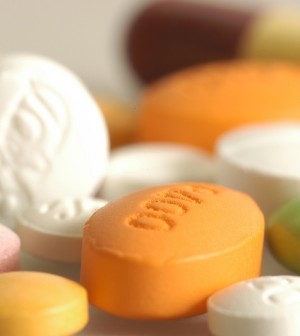- Double Mastectomy May Offer No Survival Benefit to Women With Breast Cancer
- Toxic Lead Found in Cinnamon Product, FDA Says
- Certain Abbott Blood Sugar Monitors May Give Incorrect Readings
- Athletes Can Expect High Ozone, Pollen Counts for Paris Olympics
- Fake Oxycontin Pills Widespread and Potentially Deadly: Report
- Shingles Vaccine Could Lower Dementia Risk
- Your Odds for Accidental Gun Death Rise Greatly in Certain States
- Kids From Poorer Families Less Likely to Survive Cancer
- Tough Workouts Won’t Trigger Cardiac Arrest in Folks With Long QT Syndrome
- At-Home Colon Cancer Test Can Save Lives
Health Highlights: Oct. 2, 2013


Here are some of the latest health and medical news developments, compiled by the editors of HealthDay:
FDA Bans Arsenic Drugs Used in Animal Feed
Three of four arsenic drugs used in animal feeds have been banned by the U.S.
Food and Drug Administration.
The drugs — roxarsone, carbarsone and arsanilic acid — were added to feed for chicken, turkeys and pigs to prevent disease and promote growth. However, recent studies showed levels of arsenic in chicken that exceeded amounts that occur naturally, The New York Times reported.
Nearly four years ago, the Center for Food Safety and several other advocacy groups filed a petition seeking to ban the four drugs in animal feed.
The fourth drug, nitarsone, is the only known treatment for blackhead (histomoniasis), a disease that can kill turkeys. The FDA said it will continue to study the effects of nitarsone, The Times reported.
—–
Applications for 9/11 Compensation Fund Surge as Deadline Nears
There’s been a sharp rise in the number of people applying to the 9/11 Victims Compensation Fund ahead of the Oct. 3 deadline.
As of June, about 17,000 people had applied to the fund, which was created to help people who live and work near Ground Zero with medical expenses related to the 2001 terrorist attacks on the World Trade Center, ABC News reported.
By last week the number had grown to 36,000 and is now approaching 40,000, according to the nonprofit group 9/11 Health Watch.
The final number of people who will sign up for the fund before the deadline is unclear, said the group’s executive director Ben Chavet. He noted that some estimates put at 92,000 the number of people who were in the vicinity of the twin towers on the day of the attacks, but it’s unknown how many will become sick as a result.
“We don’t really know if everyone who should come forward has come forward,” Chavet told ABC News. “And just because someone signs up for the fund doesn’t mean they are eligible for compensation.”
—–
Waterborne Bacteria Infection Kills Fla. Man
A rare infection with a type of bacteria found in water is being blamed for the death of a Florida man.
Henry Konietzky, 59, died last Monday less than 48 hours after being infected with Vibrio vulnificus, a type of bacteria in the same family as cholera that lives in warm saltwater bodes, CBS News reported.
He had been crab fishing in the Halifax River near Ormond Beach, Fla. the previous Saturday. He started feeling ill on Sunday and went to the emergency room.
V. vulnificus infections can occur when a person eats contaminated seafood or when the bacteria enters the body through an open wound. Infection can cause abdominal pain, vomiting and diarrhea. The bacteria can also infect the blood stream and the death rate is 50 percent in such cases.
Infections with V. vulnificus are rare, but may be underreported, according to the U.S. Centers for Disease Control and Prevention. It said there were more than 900 reports of the bacteria in Gulf Coast states between 1988 and 2006, CBS News reported.
Copyright © 2024 HealthDay. All rights reserved.










